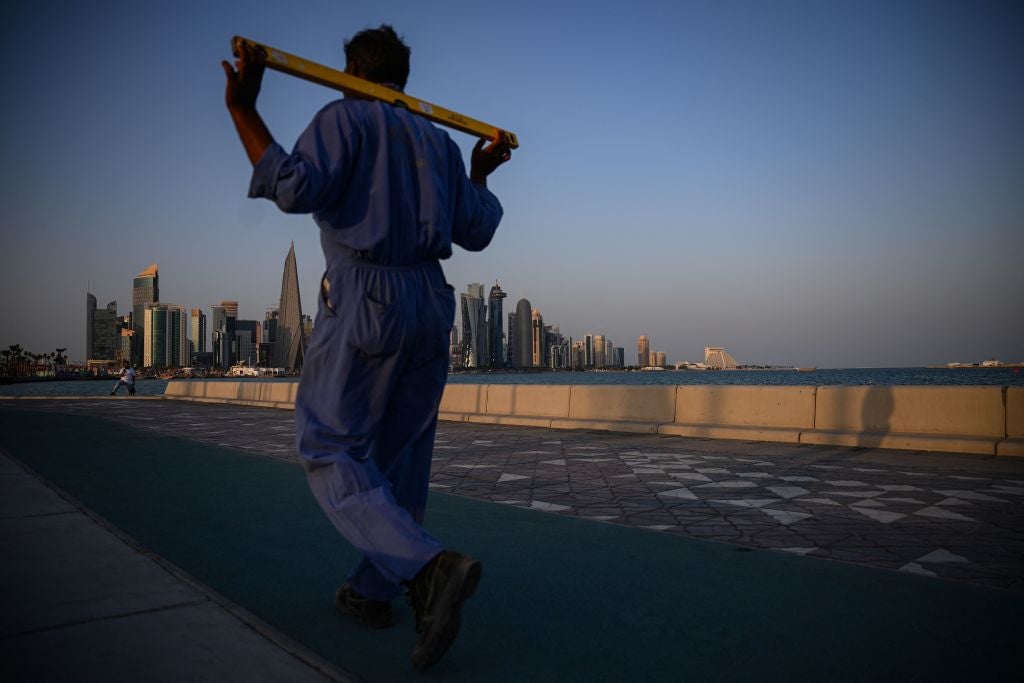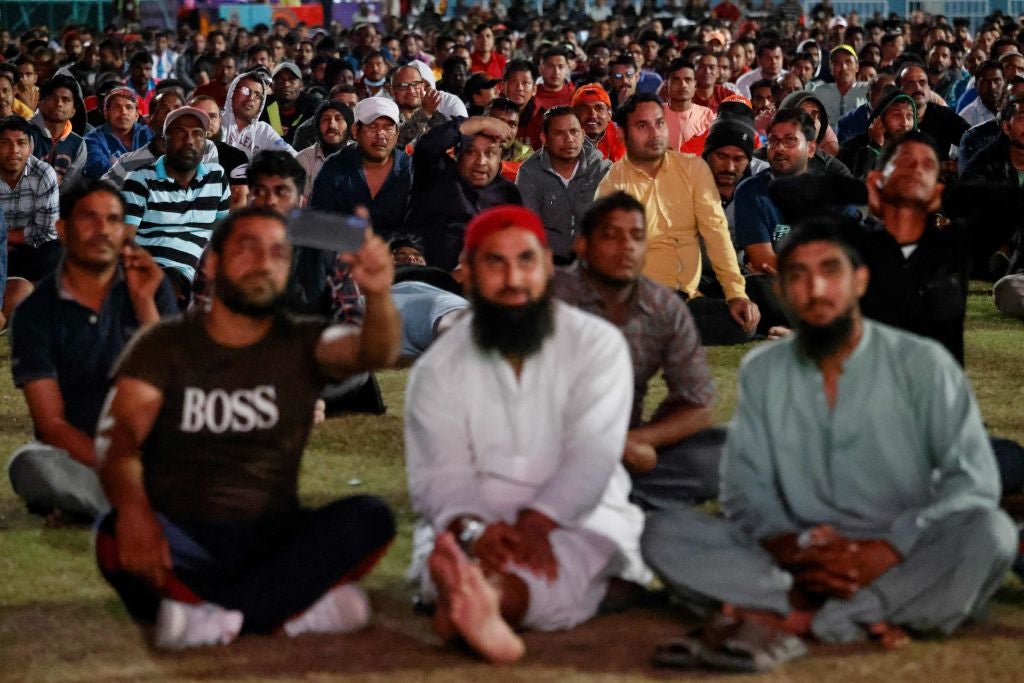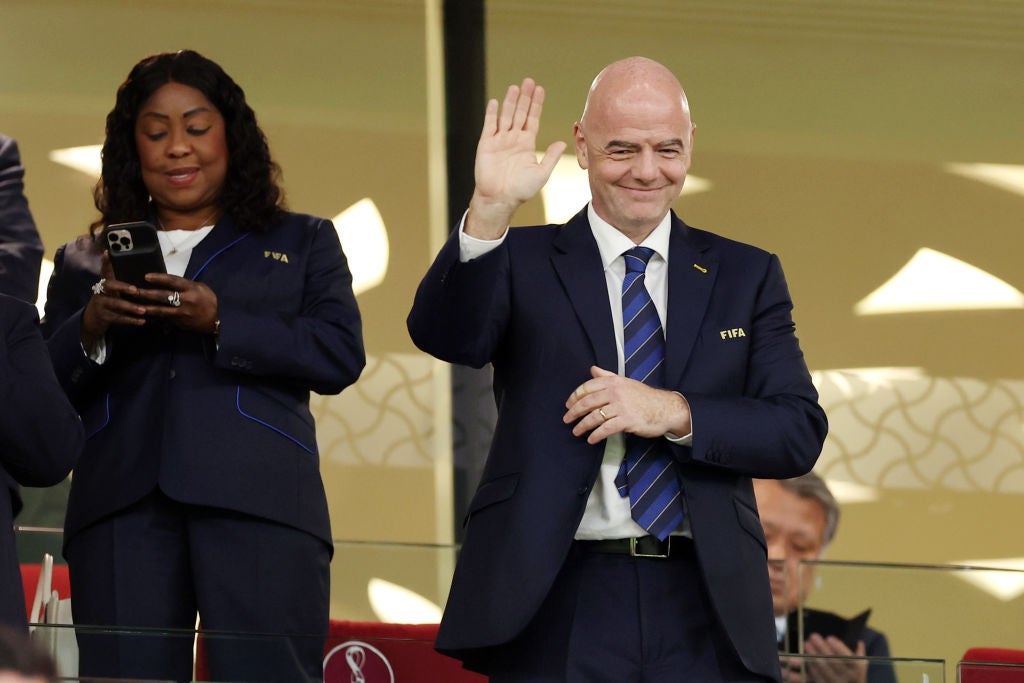Enjoying the Qatar World Cup? Here is the reality hiding in plain sight
While the football dazzles in Qatar, one of the most dominant controversies in the build-up is now rarely mentioned, reports Miguel Delaney


It is a description that was almost overlooked at the time, but that Qatar was highly attuned to, and warrants mention every day of this World Cup.
“Consultations and reports in Qatar reveal that racial and ethnic stereotypes operate in both the public and private spheres, according to which, for example, sub-Saharan African men are presumed to be unsanitary, sub-Saharan African women are presumed to be sexually available, and certain South Asian nationalities are presumed unintelligent. The Special Rapporteur received credible reports that, on the other hand, North Americans, Europeans and Australians are presumed superior, and whites in general are presumed to be inherently competent in various contexts, such as hiring and promotion decisions.”
This all comes from the report written by Professor Tendayi Achiume, the UN’s Special Rapporteur on Contemporary Forms of Racism, who is about as respected an authority as you can find on this area.
Her work was so sensitive for the Qatari state that, a week after her preliminary findings came out, they cancelled a visit planned by the UN Special Rapporteur on Slavery.
The reference to this is intended to reflect another contradiction of this World Cup. The issue of migrant workers was one of the most dominant controversies in the build-up, and is still staring people in the face, but the actual reality is now rarely mentioned over halfway into the tournament.
That is important in itself, and points to the processes in which all of this is normalised.
It is why FairSquare commissioned a video on the subject calling migrant workers “The Invisibles”. You only have to look at the recent push - much of it of course entirely innocent, albeit somewhat naive - to describe how great all of this has been; what a wonderful experience people are having.
The Independent has seen more than one case of someone marvelling at how nice “the locals” are, only for that local to be a migrant worker. It can’t be stressed enough how these labourers are denied the most basic rights of the locals - like the ability to change jobs - and can virtually never be citizens.
And, of course, it is their job to be nice. To be more than nice. Any kind of dissent or drop in attitude isn’t tolerated. Migrant workers are regularly berated. There was one case witnessed of a man in a 4x4 trying to get into a hotel gym he didn’t have the right pass for but then threatening to report the worker for denying admission, and taking his photograph as some form of leverage.
This is the culture that has developed out of the system. This is the culture that has bred one of the more unsettling experiences in Doha, but one you experience a lot. That is migrant workers being obsequiously attentive over the most minor things, out of obvious fear of failing to fulfil their duties. Otherwise, they obviously feel at risk of censure.

The blunt truth is that it just shouldn’t be normal for a human to have to behave like this. It’s demeaning. It goes beyond “hospitality”. It is strange and gross, like you are being waited on by a lower class.
And yet it all becomes so normalised, such an intrinsic but invisible part of the “experience”.
There are moments when it is difficult not think this is what elements of the American deep south must have been like during slavery. It is an underclass of people overlooked but simultaneously taken for granted, and yet underpinning absolutely everything in this state. The place couldn’t work without them. For this they receive the opposite of gratitude.
It similarly can’t be stressed enough how this is all predicated on “structural racial discrimination” and “a quasi-caste system based on national origin”. That is according to Professor Achiume and echoed by various human rights groups, as well as the workers themselves.
One Ghanaian working at this World Cup told The Independent: “Everyone is judged on their passports - and Africans are in the bottom category.”
This is in part why it’s always going to be a “great experience” for relatively wealthy westerners, especially if they just spend it in the West Bay or expensive suburbs, and why it’s utterly irrelevant.
You only have to speak to any of the workers you come across everywhere every single day, to get a sense of a world that just shouldn’t exist in 2022, and especially not one that a World Cup should reward.

It is there when you leave in the morning to go about work, and there’s a security guard there waving you off, but he’s still in the same place waving you in when you come back well over eight hours later. It’s there when another worker tells you he shares a small bedroom with four other people and considers himself fortunate because some of his compatriots are living with 12.
“My wages are paid late every month because it comes through three layers of people, and they all take a cut,” the Ghanaian worker tells The Independent. “Wages are also going down, even though Qatar obviously has enough money to pay.”
Everyone will have their story, all driven by some form of desperation, all so disgracefully different from the luxury of the West Bay.
And this, it shouldn’t be forgotten, is one of the states in the Gulf where the situation has very marginally improved. It remains far worse in those footballer and holiday hotspots of Dubai and Abu Dhabi.
Many of the same workers will of course tell westerners that they like Qatar and point out that wages are far better than at home, allowing them to provide for their family.
There are two important parts to that, though. One is that, of course, they’re going to say that since many genuinely fear surveillance and human rights investigators say it takes months to build up trust in many cases. Another is that this is still just base exploitation, global inequality taken to an extreme, as the wealthiest take advantage of the most desperate.
The World Cup should not facilitate it.
This of course raises the huge question of whether Fifa will match their prize money with a compensation fund, as a coalition of human rights groups have requested as part of the Pay Up Fifa campaign. There is still public silence

Fifa would instead point to how a compensation claim system is already in place, that it has paid out $350m to workers since 2018, and that the legacy fund will support the creation of a labour excellence hub for after the tournament - financed by a percentage of commercial revenue generated through the competition.
The human rights groups think these solutions aren't actually compensation programmes, since they are "just giving workers back what was theirs in the first place: recruitment fees and wages".
The feeling remains the governing body is not sufficiently using football’s immense leverage here. The line is still that “an opportunity has been lost”.
There remains the belief that Fifa hasn’t acted on the compensation out of reluctance to aggravate Qatar. Such a fund would implicitly mean the host nation has a greater accountability here than it has publicly accepted.
All the while, as such discussions continue, the migrant workers make this World Cup actually run.
They ensure the show goes on, inherent to it all, but invisible.
Join our commenting forum
Join thought-provoking conversations, follow other Independent readers and see their replies
Comments

Bookmark popover
Removed from bookmarks